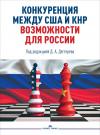Paul Richardson: Russia’s balancing role in the Asia-Pacific
Вход
Авторизуйтесь, если вы уже зарегистрированы
Globalization and geopolitics are the two defining features of contemporary international relations. Yet there exists a fundamental tension between these two processes - one refers to a deepening and broadening flow of trade, goods, people, and information; the other to exclusive political and military control over space. These competing characteristics of global politics are coming into particularly sharp focus in the Asia-Pacific, especially in the case of the South China Sea.
Today, around half the world’s trade passes through the South China Sea, however, this region is increasingly making headlines as China asserts its claims to various islands and maritime territories in the region. Largely in response to China’s expanding naval capabilities and vocal territorial claims, the United States last year announced a strategic “pivot” towards Asia – a realignment of its military power to the region. While some of America’s allies in the Asia-Pacific were reassured by this renewed commitment to preserving the status quo, this strategy has served to fuel Chinese insecurities and hastened China’s desire to resist and urgently develop its military capabilities.[1]
In East Asia, the regional order is in flux. It is a complex and dynamic region with the U.S. facing real anxieties about its reduced global status and declining relative power. At the same time China seems intent on assuming a certain degree of control over its neighboring seas in order to secure access and supply routes to the rest of the world.
Elsewhere, Japan is coming to terms with losing its status as the dominant economic power in Asia and the Fukushima disaster has profoundly shaken confidence in the current political leadership. The Korean peninsula remains as divided as ever with total uncertainty over North Korea’s direction. Australia, the Philippines, Singapore, and even Vietnam appear to be welcoming the United States “pivot” to the region, while Cambodia and others find themselves in the warm embrace of China.[2]
The result is that at the same time as intensifying regionalization and globalization in the Asia-Pacific, there is also a danger that an incident in the maritime waters of this region could become an extremely serious geopolitical threat to the region’s peace and prosperity.
There is therefore an urgent need that China and the United States find a way to co-exist with each other, and with the other powers in this region. Here an opportunity emerges for Russia. Like the United States, Russia shares a profound interest in preventing regional instability and its leadership should be extremely alarmed at the current arms race on its eastern periphery. However, unlike the U.S. or China, Russia is not viewed as a threat or rival in the region.
In the case of China, Russia has established a great deal of trust over recent years, particularly in the military sphere through the Shanghai Cooperation Organization. Russia has also been active in the post-Soviet era in building economic and cultural relations with South Korea, particularly considering the minority population of ethnic Koreans in the Russian Far East. The Russian government has also been consistent in its commitment to progress in the six-party talks with North Korea.
In regard to relations with Japan, today the talk is about economic cooperation and joint energy projects rather than territorial disputes. Even further afield, Vietnam has shown an increasing interest in Russia, expressing its enthusiasm for being involved with Russia’s recently launched Eurasian Union.[3]
Despite the legacy of Soviet might, the degree of trust towards Russia in the Asia-Pacific is symbolically revealed in the reaction to Russia’s modernization of its Pacific Fleet. Whereas China’s re-fitting of an ancient aircraft carrier caused a flurry of intensely negative coverage, there has been little fuss or outcry in this region about the procuring of two state-of-the-art Mistral assault ships which will enter service in 2014.
This perception of Russia in the region as non-threatening could be a great opportunity for the Russian leadership. To stabilize the region there is a vital need for a forum whereby geopolitics can be discussed in the same way in which economics and globalization are discussed at the annual APEC summits. Russia has experience in great power politics and the complex security arrangements of the Cold War and its continuing legacy. This provides Russia with the necessary prerequisites to promote and help implement innovative proposals for a multi-lateral security dialogue across the region.[4]
Despite the obvious challenges, Russia now has the capacity in the Far East to seriously develop and even host a new form of security architecture in the region. There needs to be a forum for openly discussing military deployments, methods for reducing threat perceptions, arms control, and even demilitarized zones around some of the contested territories. With the U.S. bound by alliance treaties to many of the states in the region, and the Chinese government seemingly beholden to a rising tide of nationalism, it is vital that there is an inclusive multi-lateral framework so that a minor, localized incident at sea does not provoke a crisis of global proportions.
With its own interest in regional stability, a long experience of great power diplomacy, as well as high levels of trust amongst the Asian powers, Russia has the potential to play a significant role in mediating the tectonic geopolitical shifts in the region. Rather than the much touted bridge between Europe and Asia, Russia could find itself bridging the gap in understanding between the U.S. and China.
Author: Paul Richardson, Associate Professor, School of Regional and International Studies, Far Eastern Federal University
[1] Robert Ross, “The Problem With the Pivot” Foreign Affairs (Nov/Dec 2012)
[2] Mark Valencia, “High Stakes Drama: The South China Sea Disputes” Global Asia, 7,3 (Fall 2012)
[4] Serious debate on such a framework has already started. See particularly Chapter 2 of the Valdai Discussion Group’s Toward the Great Ocean, or the new Globalisation of Russia, published in July 2012 (http://vid-1.rian.ru/ig/valdai/Toward_great_ocean_eng_short.pdf)
Коллективный блог экспертов ДВФУ
Блог: Россия и АТР: взгляд из Владивостока
Рейтинг: 33




